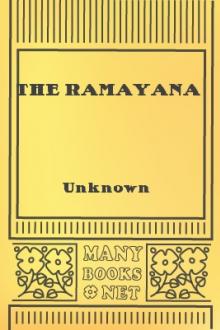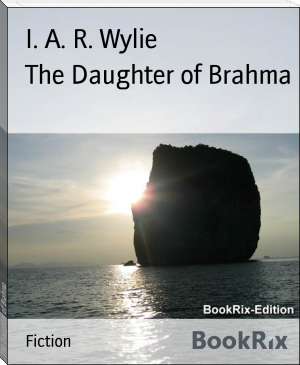The Ramayana - Valmiki (best ereader for epub txt) 📗

- Author: Valmiki
- Performer: -
Book online «The Ramayana - Valmiki (best ereader for epub txt) 📗». Author Valmiki
taken as the type of a woman protected by a jealous and all-powerful husband.
861.
The mountain near Kishkindhá.
862.
Airávat is the mighty elephant on which Indra delights to ride.
863.
Vibhishaṇ is the wicked Rávaṇ's good brother.
864.
Her name is Kalá, or in the Bengal recension Nandá.
865.
One of Rávaṇ's chief councillors.
866.
Hanumán when he entered the city had in order to escape observation condensed himself to the size of a cat.
867.
The brook Mandákiní, not far from Chitrakúṭa where Ráma sojourned for a time.
868.
The poet here changes from the second person to the third.
869.
The whole long story is repeated with some slight variations and additions from Book II, Canto XCVI. I give here only the outline.
870.
The expedients to vanquish an enemy or to make him come to terms are said to be four: conciliation, gifts, disunion, and force or punishment. Hanumán considers it useless to employ the first three and resolves to punish Rávaṇ by destroying his pleasure-grounds.
871.
Kinkar means the special servant of a sovereign, who receives his orders immediately from his master. The Bengal recension gives these Rákshases an epithet which the Commentator explains “as generated in the mind of Brahmá.”
872.
Ráma de jure King of Kośal of which Ayodhyá was the capital.
873.
Chaityaprásáda is explained by the Commentator as the place where the Gods of the Rákshases were kept. Gorresio translates it by “un grande edificio.”
874.
The bow of Indra is the rainbow.
875.
We were told a few lines before that the chariot of Jambumáli was drawn by asses. Here horses are spoken of. The Commentator notices the discrepancy and says that by horses asses are meant.
876.
Armed with the bow of Indra, the rainbow.
877.
Rávaṇ's son.
878.
Conqueror of Indra, another of Rávaṇ's sons.
879.
The śloka which follows is probably an interpolation, as it is inconsistent with the questioning in Canto L.:
He looked on Rávaṇ in his pride,
And boldly to the monarch cried:
“I came an envoy to this place
From him who rules the Vánar race.”
880.
The ten heads of Rávaṇ have provoked much ridicule from European critics. It should be remembered that Spenser tells us of “two brethren giants, the one of which had two heads, the other three;” and Milton speaks of the “four-fold visaged Four,” the four Cherubic shapes each of whom had four faces.
881.
Durdhar, or as the Bengal recension reads Mahodara, Prahasta, Mahápárśva, and Nikumbha.
882.
The chief attendant of Śiva.
883.
Bali, not to be confounded with Báli the Vánar, was a celebrated Daitya or demon who had usurped the empire of the three worlds, and who was deprived of two thirds of his dominions by Vishṇu in the Dwarf-incarnation.
884.
When Hanumán was bound with cords, Indrajít released his captive from the spell laid upon him by the magic weapon.
885.
“One who murders an ambassador (rája bhata) goes to Taptakumbha, the hell of heated caldrons.” Wilson's Vishṇu Puraṇa, Vol. II. p. 217.
886.
The fire which is supposed to burn beneath the sea.
887.
Sítá is likened to the fire which is an emblem of purity.
888.
I omit two stanzas which continue the metaphor of the sea or lake of air. The moon is its lotus, the sun its wild-duck, the clouds are its water-weeds, Mars is its shark and so on. Gorresio remarks: “This comparison of a great lake to the sky and of celestial to aquatic objects is one of those ideas which the view and qualities of natural scenery awake in lively fancies. Imagine one of those grand and splendid lakes of India covered with lotus blossoms, furrowed by wild-ducks of the most vivid colours, mantled over here and there with flowers and water weeds &c. and it will be understood how the fancy of the poet could readily compare to the sky radiant with celestial azure the blue expanse of the water, to the soft light of the moon the inner hue of the lotus, to the splendour of the sun the brilliant colours of the wild-fowl, to the stars the flowers, to the cloud the weeds that float upon the water &c.”
889.
Sunábha is the mountain that rose from the sea when Hanumán passed over to Lanká.
890.
Three Cantos of repetition are omitted.
891.
Madhuvan the “honey-wood.”
892.
Indra's pleasure-ground or elysium.
893.
Janak was king of Videha or Mithilá in Behar.
894.
The original contains two more Cantos which end the Book. Canto LXVII begins thus: “Hanumán thus addressed by the great-souled son of Raghu related to the son of Raghu all that Sítá had said.” And the two Cantos contain nothing but Hanumán's account of his interview with Sítá, and the report of his own speeches as well as of hers.
895.
The Sixth Book is called in Sanskrit Yuddha-Káṇḍa or The War, and Lanká-Káṇda. It is generally known at the present day by the latter title.
896.
Váyu is the God of Wind.
897.
Garuḍa the King of Birds.
898.
Serpent-Gods.
899.
The God of the sea.
900.
Indra's elephant.
901.
Kuvera, God of wealth.
902.
Kuvera's elephant.
903.
The planet Venus, or its regent who is regarded as the son of Bhrigu and preceptor of the Daityas.
904.
The seven rishis or saints who form the constellation of the Great Bear.
905.
Triśanku was raised to the skies to form a constellation in the southern hemisphere. The story in told in Book I, Canto LX.
906.
The sage Viśvámitra, who performed for Triśanku the great sacrifice which raised him to the heavens.
907.
One of the lunar asterisms containing four or originally two stars under the regency of a dual divinity Indrágni, Indra and Agni.
908.
The lunar asterism Múla, belonging to the Rákshases.
909.
The Asurs or demons dwell imprisoned in the depths beneath the sea.
910.
The God of Riches, brother and enemy of Rávaṇ and first possessor of Pushpak the flying car.
911.
King of the Serpents. Śankha and Takshak are two of the eight Serpent Chiefs.
912.
The God of Death, the Pluto of the Hindus.
913.
Literally Indra's conqueror, so called from his victory over that God.
914.
Their names are Nikumbha, Rabhasa, Súryaśatru, Suptaghna, Yajnakopa, Mahápárśva, Mahodara, Agniketu, Raśmiketu, Durdharsha, Indraśatru, Prahasta, Virúpáksha, Vajradanshṭra, Dhúmráksha, Durmukha, Mahábala.
915.
Similarly Antenor urges the restoration of Helen:
“Let Sparta's treasures be this hour restored,
And Argive Helen own her ancient lord.
As this advice ye practise or reject,
So hope success, or dread the dire effect,”
Pope's Homer's Iliad, Book VII.
916. The Agnisálá or room where the sacrificial fire was kept. 917. The exudation of a fragrant fluid from the male elephant's temples, especially at certain seasons, is frequently spoken of in Sanskrit poetry. It is said to deceive and attract the bees, and is regarded as a sign of health and masculine vigour. 918. Consisting of warriors on elephants, warriors in chariots, charioteers, and infantry. 919. Indra, generally represented as surrounded by the Maruts or Storm-Gods. 920. Janasthán, where Ráma lived as an ascetic. 921. Máyá, regarded as the paragon of female beauty, was the creation of Maya the chief artificer of the Daityas or Dánavs. 922. One of the Nymphs of Indra's heaven. 923. The Lotus River, a branch of the heavenly Gangá. 924. Trilokanátha, Lord of the Three Worlds, is a title of Indra. 925. The celestial elephant that carries Indra. 926. As producers of the ghi, clarified butter or sacrificial oil, used in fire-offerings. 927. This desertion to the enemy is somewhat abrupt, and is narrated with brevity not usual with Válmíki. In the Bengal recension the preceding speakers and speeches differ considerably from those given in the text which I follow. Vibhishaṇ is kicked from his seat by Rávaṇ, and then, after telling his mother what has happened, he flies to Mount Kailása where he has an interview with Śiva, and by his advice seeks Ráma and the Vánar army. 928. Vṛihaspati the preceptor of the Gods. 929. In Book II, Canto XXI, Kaṇdu is mentioned by Ráma as an example of filial obedience. At the command of his father he is said to have killed a cow. 930. A King of the Yakshas, or Kuvera himself, the God of Gold. 931. The brace protects the left arm from injury from the bow-string, and the guard protects the fingers of the right hand. 932. The story is told in Book I, Cantos XL, XLI, XLII. 933. Fiends and enemies of the Gods. 934. The Indus. 935. Cowherds, sprung from a Bráhman and a woman of the medical tribe, the modern Ahírs. 936. Barbarians or outcasts. 937. Vraṇa means wound or rent. 938. Here in the Bengal recension (Gorresio's edition), begins Book VI. 939. The Goomtee. 940. The Anglicized Nerbudda. 941. According to a Pauranik legend Keśarí Hanumán's putative father had killed an Asur or demon who appeared in the form of an elephant, and hence arose the hostility between Vánars and elephants. 942. Here follows the enumeration of Sugríva's forcesFree e-book «The Ramayana - Valmiki (best ereader for epub txt) 📗» - read online now
Similar e-books:





Comments (0)